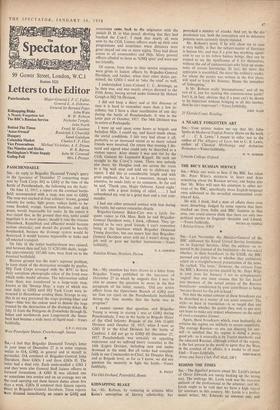SIR,—Last November the Director-General of the BBC addressed the Royal
United Service Institution on its External Services. After the address—as re- ported in the Journal of the Institution—he was asked whether, in theii broadcasts to the USSR, the BBC pursued any policy line or whether they exclusively relied on a straightforward presentation of the news. He replied, 'The latter.' However, the extracts from the BBC's Russian service quoted by Mr. Peter Wiles in your issue for January 1 are so conspicuously 'angled' that one must assume that Sir Ian Jacob was -unaware of the actual nature of the Russian broadcasts—condemned by your contributor as being 'too pro-Soviet for the job in hand.'
Not that the actual content of these broadcasts can be described as a matter of too acute concern! The style—at least in translation—is so turgid that one must doubt whether the points they seek to put over can hope to make any impact whatsoever on the mind of even a receptive listener.
Again, those broadcasts which, even hesitantly, do criticise the regime are unlikely to secure receptivity. The average Russian—as one can discover for one- self—is satisfied that his regime is doing a pretty good job : as it assuredly is by Tsarist standards; and the educated Russian, although critical of the regime, is the last person in the world to agree that the West, in the conduct of its affairs, is a model to all man-
kind.—Yours faithfully, JOHN NORTH Army and Navy Club, Pall Mall, SW1


































 Previous page
Previous page